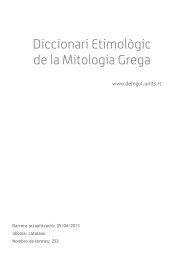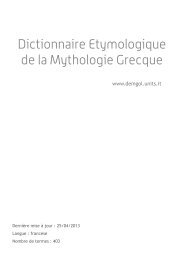Etymological Dictionary of Greek Mythology - Dizionario etimologico ...
Etymological Dictionary of Greek Mythology - Dizionario etimologico ...
Etymological Dictionary of Greek Mythology - Dizionario etimologico ...
Create successful ePaper yourself
Turn your PDF publications into a flip-book with our unique Google optimized e-Paper software.
<strong>Etymological</strong> <strong>Dictionary</strong> <strong>of</strong> <strong>Greek</strong> <strong>Mythology</strong> - www.demgol.units.it<br />
The name means "agate (chalcedony quartz)" and is probably a loan word (Chantraine, DELG, s. v.).<br />
Category: Names <strong>of</strong> characters<br />
Ἀχιλλεύς<br />
ACHILLES<br />
Name <strong>of</strong> the son <strong>of</strong> Peleus and Thetis, father <strong>of</strong> Pyrrhus Neoptolemus (Hom. Il. passim).<br />
Already in Mycenaean in the form a-ki-re-u (KN Vc 106). The etymology is not clear, but different hypotheses have been<br />
made: 1) According to Apollodorus (Bibl. 3.13.6; Schol. ad Lycophr. 178, etc.) the hero was so named by Chiron his lips<br />
had never tasted the milk <strong>of</strong> Thetis, and so the name would be from ἀ- privative and χείλη, "lip". 2) It could be a pre-<br />
Hellenic name (Bosshardt, Die Nomina auf -εύς, par. 444 and Nordheider, in Snell, Lex. fr. Ep., col. 1754). 3) It could be<br />
from ἄχος, "pain", through a form *ἄχιλος, as ὄργιλος derives from ὀργή (Kretschmer, "Glotta" 4, 1915, pp. 305-308);<br />
it could also be a hypochoristic <strong>of</strong> * Ἀχι-λάος, again from ἄχος but with λάος, "people" (Palmer, Interpretation, p. 79):<br />
"he whose people has pain"; Nagy (The Best <strong>of</strong> the Achaeans, pp. 69-71) agrees with this hypothesis, considering such<br />
a name to accord well with the hero's fortunes. Holland ("Glotta" 71, 1993, pp. 17-27) criticizes Nagy's interpretation<br />
on various grounds and prefers to take the first part <strong>of</strong> the name as a verb meaning "frighten", given the connection <strong>of</strong><br />
ἄχος with terms in other Indo-European languages meaning "terror, fear": thus the name would mean "he who frightens<br />
the army". 4) According to Carnoy (DEMGR) the figure is a water divinity, his name deriving from Indo-European *aq a<br />
through Pelasgic -- a highly unlikely derivation.<br />
Category: Names <strong>of</strong> heroes<br />
Ἀδαμάστωρ<br />
ADAMASTOR<br />
A huge monster*, as big as the Colossus <strong>of</strong> Rhodes, that appeared to Vasco de Gama and the Portuguese fleet near the<br />
Cape <strong>of</strong> Good Hope , foretelling disaster. Probably invented by Camões, Lusíadas 5, st. 41-51, on classical models. He is<br />
referred to as the companion <strong>of</strong> Enceladus, Aegaeon and <strong>of</strong> the other Giants who fought against the gods. Interrogated<br />
by the leader <strong>of</strong> the expedition, he tells <strong>of</strong> his own unhappy love for the wife <strong>of</strong> Peleus, Thetis, who tricked him with an<br />
apparition <strong>of</strong> herself, for which he was transformed into the rock <strong>of</strong> the Cape <strong>of</strong> Good Hope (Lus. st. 52-60). This figure<br />
is almost totally unknown to <strong>Greek</strong> and Roman mythology, which refers to a giant Damastor (Claudian. Gigant. 101-103),<br />
while one Adamasthor is listed among the other giants only in Sidon. Apollin. Carm. 15.20 (sec. V- inizi VI d.e.v.).<br />
The name is a nomen agentis formed with the suffix -τωρ, from the verbal adjective ἀδαμαστός, which means<br />
"unconquerable" "unconquered", used frequently <strong>of</strong> young women who have not had sexual relations with a man (from<br />
ἀ- privativo e δαμ-, δάμνημι, δαμάω). It seems to be constructed by analogy with Alàstor, Phobètor, and would mean<br />
"that is unconquerable", "implacable". The adjective ἀδαμάστωρ (v. l. ἀδαμάτωρ) is also found in Pap. Mag. IV 2717,<br />
in the sense <strong>of</strong> "virgin", said <strong>of</strong> Hecate.<br />
Category: Names <strong>of</strong> gods<br />
Theme: Transformation<br />
4







